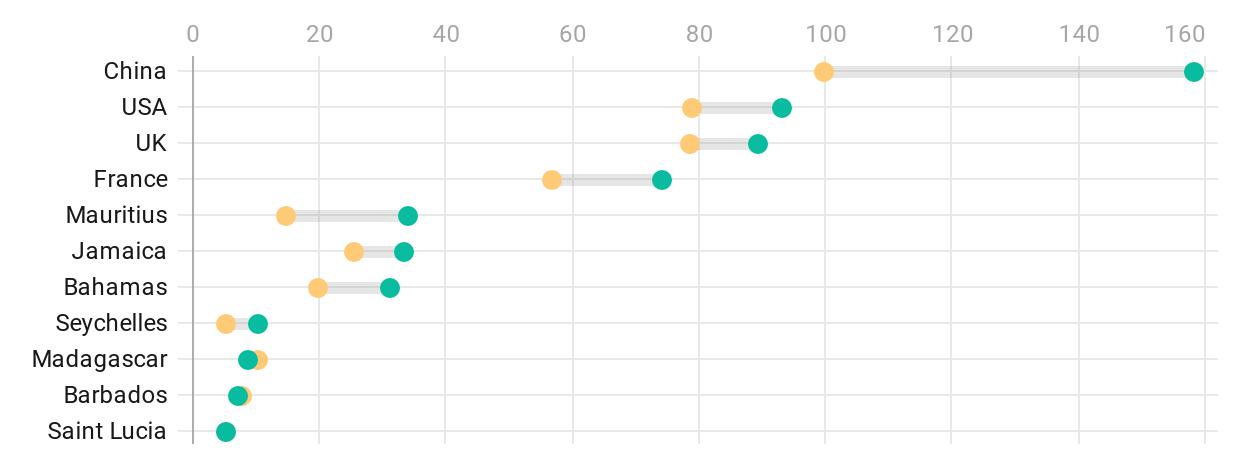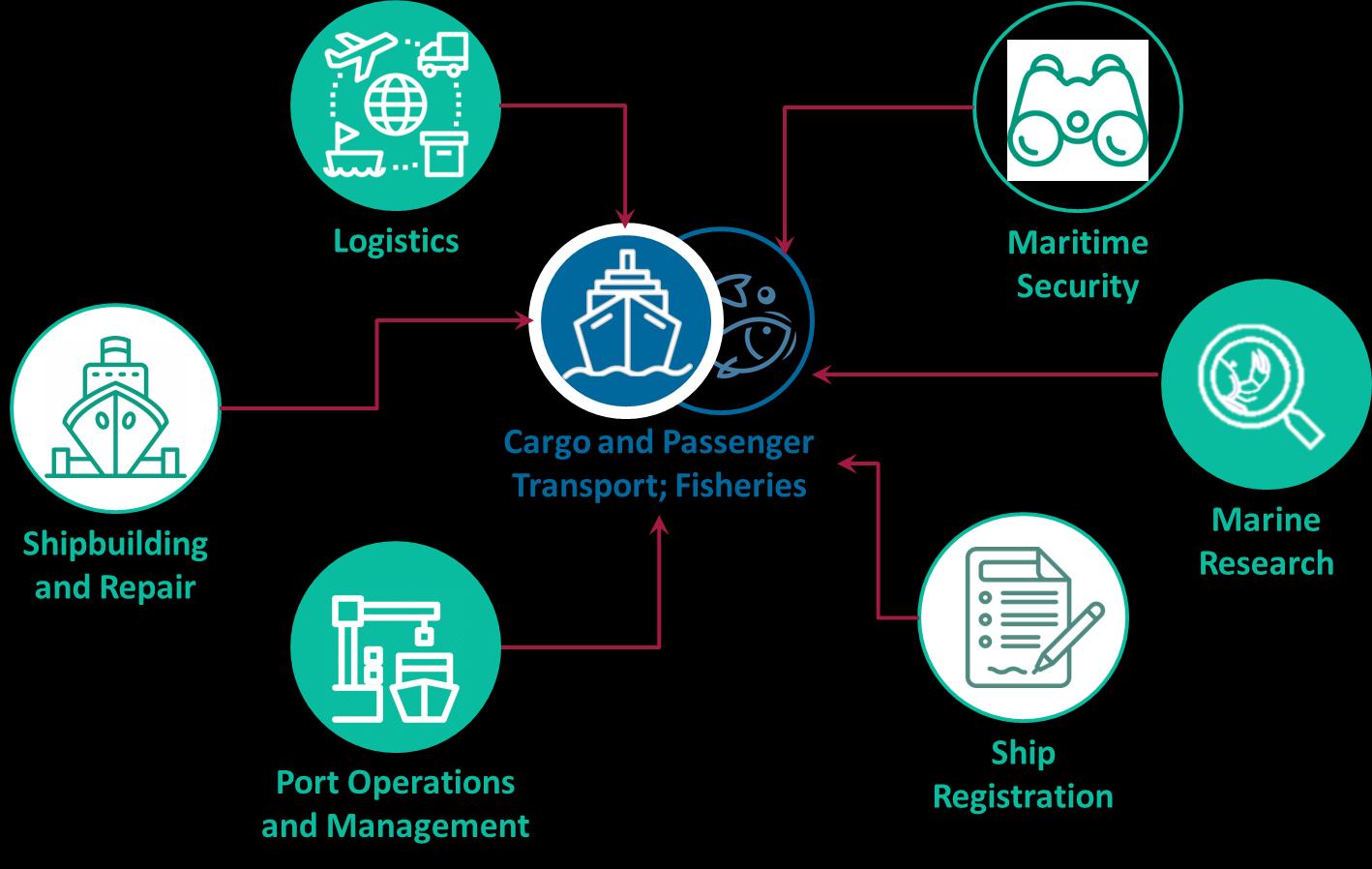
4 minute read
Trends in Maritime Sector
3.3 Maritime
Increased trade and integration into global and regional value chains are widely appreciated as critical strategies to economic growth. Maritime is the key mode of transport facilitating international trade. UNCTAD estimates that 80% of the volume of global merchandise trade is carried by the sea – a share that is undoubtably higher for “sea locked” countries like Seychelles and The Bahamas. Maritime ports are the critical to facilitating fish trade, food and fuel imports, and to differing degrees, tourist access. Additionally, for multi-island nations, inter-island ferry services are important to local transport networks.
Advertisement
Note that despite its importance as a facilitator, the sector is less heavily researched as tourism and fisheries. This section is briefer as research is ongoing, and the COVID-19 impacts are still being measured.
Pre-COVID-19 Trends
UNCTAD data indicates that between 2018 and 2019, non-passenger port calls to Seychelles declined by 14%. During the period, the value of total exports decreased by 9%, which may have contributed to the drop in maritime traffic. Seychelles is located on or near to some North-South trading routes, but mainly South and East Asia to East Africa. Despite this, Seychelles is not a major global trade transhipment point and has a relatively low globally shipping connectivity (Figure 21). However, for the past 25 years, Port Victoria has been the major transhipment port for tuna in the Western Indian Ocean.
The Bahamas’ proximity to the US and its positioning in the global East-West belt provides great geographical advantages to positioning as a major trans-shipment port (UNCTAD, 2014a). Freeport, Bahamas is competitive, developed, and thus well integrated into the global linear service network, as evidenced by the high number of port calls. From 2018 to 2019, the number of non-passenger port calls to Bahamas’ seaports increased modestly by 1% to 2,486. However, passenger (cruise) ships dominate the country’s port calls (Figure 20). Including these, overall port calls increased by 9% in 2019. However, while The Bahamas is very well connected to countries outside the region, it has low connectivity within the Caribbean (UNCTAD, 2014b).

Figure 20: Port Calls by Vessel Type, 2019
Data source: UNCTADstat, 2020

Figure 21: Linear Shipping Connectivity Index, Q1 2006 v. Q1 2020
Data source: UNCTADstat, 2020
Of course, the martime sector is far broader than just transport and fishing activities. Martime jobs and business opportunties cover a wide range of supporting, yet critical activities in the sector (Figure 22). Geograghical distance from main shipping routes and between trading partners only partially determine the level of freight costs. Costs are also impacted by a country’s linear connectivity, transit time, port infrastructure, security, and the quality of logistics and port management (Wilmsmeier & Hoffman, 2008). For example logistics activities ensure the efficient flow of goods, which may reduce costs. Well-developed operations (including infrastucture, labour, and management) improve the capacity of ports to handle large cargo volumes in a safe and timely manner. This has a direct impact on the costs to shippers, thus impacting the overall cost of imports/exports. Figure 22: Activities in the Maritime Sector

Figure 22: Activities in the Maritime Sector
Source: Authors
Short port times and low per-unit freight rates are commonly cited indicators of port efficiency and trade competitiveness. In 2019, the median time in port across all merchandise ships was 0.85 days in The Bahamas and 1.84 days in Seychelles. Break bulk vessels, which accounted for 41% of Seychelles’ port calls, spent a median of 5.22 days in port – the second slowest turnaround globally (UNCTAD, 2019). While SIDS tend to pay a higher than average share of import costs on freight, Seychelles has historically been among the highest (Figure 23).

Figure 23: Transport Expenditure as % of the Value of Imports, 2004-2013 Average
Source: UNCTAD, 2014a
Seychelles’ port efficiency is likely to improve tremendously in the next few years. The Seychelles Port Authority (SPA) was established in 2004 to manage Port Victoria, other ports, and the Seychelles EEZ. The SPA is proceeding with plans to expand and upgrade Port Victoria with USD41 million financing from Agence Française de Développement, the European Investment Bank (EIB), and the European Union. The planned upgrades will double the number of ships and cargo that the port can handle.
With its advantageous location, competitive fees and accommodating tax laws, The Bahamas is a popular location for registering foreign ships. The Bahamas Maritime Authority (BMA) is responsible for registering and regulating ships under the Bahamian flag, and it has over 1,500 ships on its Registrar – one of the largest in the world. According to UNCTAD, in 2020, 3.7% of the world’s merchant fleet (8.9% of the world fleet value) was registered in The Bahamas. In particular, The Bahamas is popular for cruise lines and oil tankers (Figure 24). Over 10% of the world’s passenger ships are registered in The Bahamas, including ships from Royal Caribbean, Norweigan and Carnival cruises. The Bahamaian share of global passenger ships has more than doubled since the turn of the century. The island-state has also registered almost 5% of oil tankers, including ships for Chevron and Exxon. While impressive, this has declined somewhat in recent years. Regardless, ship registrations has been a reliable source of revenue. From its formation in 1995 to 2019, the BMA has raised just under USD5 million each year (Hartnell, 2020).

Figure 24: Bahamas Share of Global Merchant Fleet Registrations by Vessel Type, 2000 vs 2020
Data source: UNCTADstat, 2020
In the Indian Ocean, Seychelles is also an important flag state, for primarily Spanish and Taiwanese-owned and operated fishing vessels. For example, in 2017, Seychelles-flagged industrial vessels caught the second largest volume of tuna, but most of these were Spanish operated. Similar to The Bahamas, registering a ship in the Seychelles incurs many benefits, including certain tax and business exemptions and it is open to Seychellois and foreigners who hold IBC licenses.






